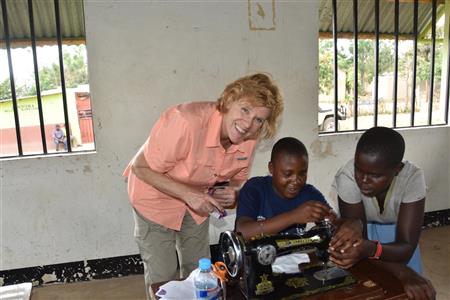Tanzania: Rotarians Making a Difference
"My husband and I joined 8 other Rotarians on a 12 day trip to Tanzania in January. Part of this trip was a safari and part of the trip was Rotary service. I could go on for days about the safari, but to suffice it to say we saw some amazing animals in their own environments. As me later about the elephant and the tent story! Everyone should put a safari on their bucket list.
Wanzita is the scholarship exchange student from Tanzania who is currently staying in Northfield and having a wonderful exchange year. We visited her mother and family on their rural "farm" in Tanzania. The extended family of 10 lives in a 8 x 12 hut without running water or electricity. Can you all imagine the culture shock Wanzita went through coming to the United States? She plans on returning to her village and studying to become a nurse.
We spent four days in various service opportunities. Edina Morningside has participated in a small international grant funding Project Zawadi and the bunkbeds. PROJECT ZAWADI’s mission is to provide educational opportunities within a nurturing environment to orphaned and other vulnerable children in Tanzania, so that they become self-reliant and active members of their communities. Children were walking miles to get to school, so the building of a dormitory has made it possible for them to stay at the school during the week. Our traveling team spent a day handing out shoes, school uniforms and school supplies to the 250 children that Project Zawadi supports...... in addition to visiting 3 of the schools.
The women of our traveling team also spent one day teaching the young girls of ProjectZawadi how to sew their own menstrual kits. This is a project initiated by Districts 5950 and 5960. Being that there was no electricity, the sewing machines were the old treadle machines but our mission was successful!
We attended the Rotary meeting of Tanzania. We spent the day visiting the three projects that that club is involved in.
1. This project is a school for Albino children. Apparently Albino'ism is very prevalent in Africa and not surprisingly, these children are ostracized.
2. We visited a school run by Catholic nuns for young girls running away from genital mutilization..... which is still common in Africa. The Rotarians provided a fish pond for tilapia to help feed the girls.
3. The Rotary Club of Tanzania also has a micro economics program where they give about $300.00 US each month to several Albino adults. This money is used to fund a business such as basket weaving. Each month the business owner pays Rotary back from the proceeds of their business and lives off the other profits. This business model provides an opportunity for self reliance to individuals not otherwise able to support themselves and their families."
